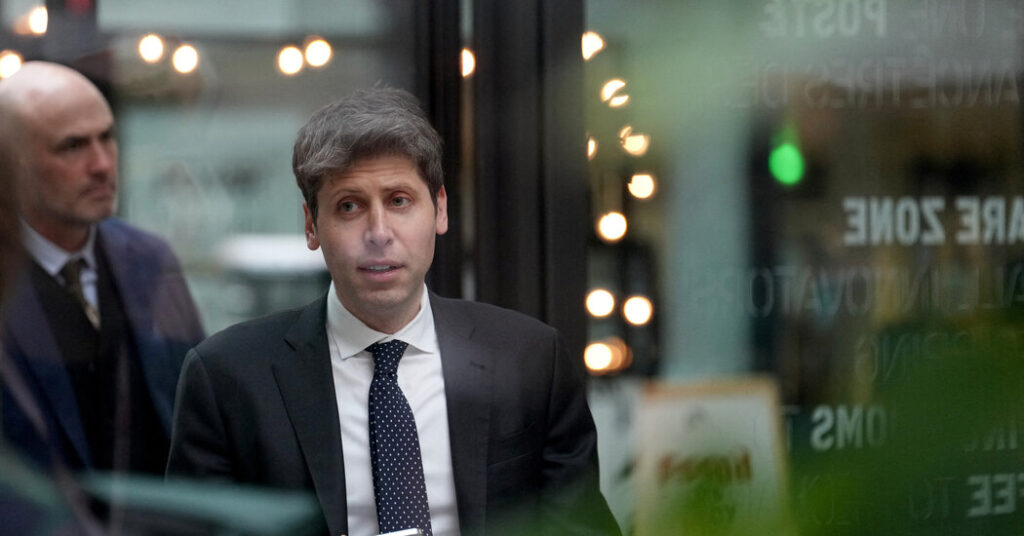OpenAI’s board of directors on Wednesday questioned the rationale of a $97.4 billion bid from Elon Musk and others to gain control of the high-profile artificial intelligence company.
On Monday, a consortium of investors led by Mr. Musk offered to buy the assets of the nonprofit that controls the company, escalating a yearslong feud between Mr. Musk and OpenAI’s chief executive, Sam Altman.
In a court filing on Wednesday, the company said Mr. Musk’s bid contradicted legal claims the billionaire made in a lawsuit he brought against OpenAI last year. OpenAI argued in its filing that Mr. Musk said in his lawsuit the assets must remain with the nonprofit and could not be transferred to another entity for public gain.
The company is essentially accusing Mr. Musk of hypocrisy. In his lawsuit, he argued OpenAI must be governed by the nonprofit. Now, OpenAI contends, he is arguing the opposite.
The OpenAI board has not yet formally rejected the bid.
Marc Toberoff, a Los Angeles lawyer who filed the lawsuit against OpenAI on behalf of Mr. Musk, said in a statement to The New York Times on Wednesday: “The lawsuit is not about who controls OpenAI. It’s about Sam Altman and OpenAI’s misconduct.”
If OpenAI’s board “is prepared to stipulate to take the ‘For Sale’ sign off the charity’s assets in its so-called ‘conversion,’ Musk will withdraw his bid,” Mr. Toberoff added, referring to OpenAI’s efforts to sever itself from the nonprofit’s control. “But, of course, OpenAI will never do that.”
The bid from Mr. Musk’s consortium could still complicate Mr. Altman’s efforts to separate the company from the nonprofit board and raise the billions of dollars that OpenAI needs to build new technologies.
For more than a year, Mr. Altman and his colleagues have been working on a plan to shift control of the company from the nonprofit to OpenAI’s investors, including Microsoft and the investment firm Thrive Capital.
OpenAI has been negotiating a $40 billion fund-raising deal, led by the Japanese conglomerate SoftBank. The new fund-raising round values OpenAI at $300 billion, according to three people with knowledge of the deal who spoke on the condition of anonymity.
The San Francisco company’s unusual corporate structure provided an opening for Mr. Musk to meddle in that plan and make revamping OpenAI more expensive.
In order to separate from the nonprofit board, Mr. Altman and his colleagues must provide compensation. OpenAI might pay the nonprofit a one-time fee, for instance, or give it a minority stake in the company.
The nonprofit’s assets, however, have not been given a value. Mr. Musk is trying to set one, and his offer could mean that OpenAI’s for-profit arm would have to spend more to gain independence from the old nonprofit.
The clock is ticking for OpenAI to change how it operates. Under the terms of OpenAI’s last investment round, it must shift control of the company away from the nonprofit in less than two years. Otherwise, its funding will convert into debt, according to documents reviewed by The New York Times.
(The Times has sued OpenAI and Microsoft, claiming copyright infringement of news content related to A.I. systems. The two companies have denied the suit’s claims.)
Mr. Musk’s aggressive move is the latest in a very personal fight with Mr. Altman that started 10 years ago as a partnership. They were part of the group that founded OpenAI as a nonprofit in 2015, saying they wanted to freely share their technologies with the world.
When Mr. Musk left the organization three years later after a battle for control, Mr. Altman attached OpenAI to a for-profit company so he could raise the enormous amounts of money needed to build A.I. technologies.
In late 2023, the nonprofit board suddenly fired Mr. Altman, saying it no longer trusted him to build A.I. for the benefit of humanity — which was one of the original principles of the nonprofit.
He returned to the company in just five days and began stacking the board with his allies, while exploring ways of severing the nonprofit’s control. If they severed the nonprofit’s control, Mr. Altman and his allies believed, OpenAI would be more attractive to investors.
Before the bid that became public on Monday, Mr. Musk also moved to block the changes to OpenAI’s management structure with a lawsuit filed in federal court last year.


